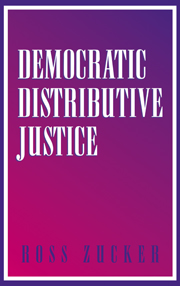Book contents
- Frontmatter
- Contents
- Acknowledgments
- 1 Democracy and Economic Justice
- Part I Unequal Property and Individualism in Liberal Theory
- Part II Egalitarian Property and Justice as Dueness
- 5 Whose Property Is It, Anyway?
- 6 The Social Nature of Economic Actors and Forms of Equal Dueness
- 7 Policy Reflections: The Effect of an Egalitarian Regime on Economic Growth
- Part III Egalitarian Property and the Ethics of Economic Community
- Part IV Democracy and Economic Justice
- Conclusions
- References
- Index
6 - The Social Nature of Economic Actors and Forms of Equal Dueness
Published online by Cambridge University Press: 02 December 2009
- Frontmatter
- Contents
- Acknowledgments
- 1 Democracy and Economic Justice
- Part I Unequal Property and Individualism in Liberal Theory
- Part II Egalitarian Property and Justice as Dueness
- 5 Whose Property Is It, Anyway?
- 6 The Social Nature of Economic Actors and Forms of Equal Dueness
- 7 Policy Reflections: The Effect of an Egalitarian Regime on Economic Growth
- Part III Egalitarian Property and the Ethics of Economic Community
- Part IV Democracy and Economic Justice
- Conclusions
- References
- Index
Summary
The correct regulative principle for anything depends on the nature of that thing.
John RawlsConsumer contributions should be taken into account by the ethics of dueness because, as the preceding chapter showed, they are factors in the creation of value and, as such, they can generate corresponding entitlements to value. When these factors are taken into account, how do they affect the principle of distribution of property? Do consumers make highly unequal or relatively equal contributions to the creation of the value of commodities? Or are they simultaneously equal in some respects and different in others? If individual consumers make entirely equal economic contributions, the ethics of dueness yields a principle of equal distribution of income. If consumers make highly unequal economic contributions, then such ethics require a principle of highly unequal distribution of income. But it is conceivable, furthermore, that each consumer makes some equal contributions and some unequal ones, on the basis of which he or she accures a compound right to an equal distribution of a portion of total social income and an unequal distribution of the rest.
Taking consumption-side contributions into account does not produce a complete ethics of dueness, only a theory of dueness for consumption contributions. A full ethics of dueness would combine this with producer contributions. At the present stage of developing the ethics of dueness, it is particularly important to incorporate the consumption side. Economists since the 1870s have known that consumers contribute to creating the value of commodities, yet this fact has not been adequately addressed by the ethics of dueness, which is still dominated by the obsolete assumption that only productive agents create value.
- Type
- Chapter
- Information
- Democratic Distributive Justice , pp. 108 - 141Publisher: Cambridge University PressPrint publication year: 2000



